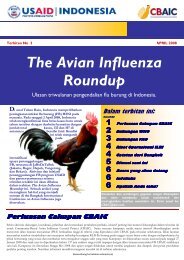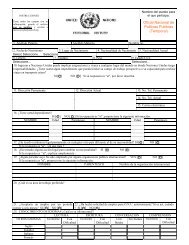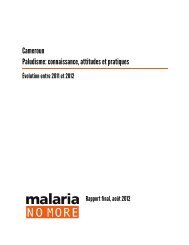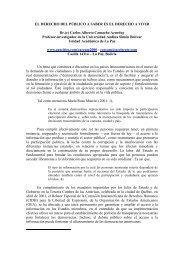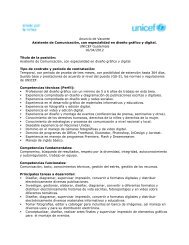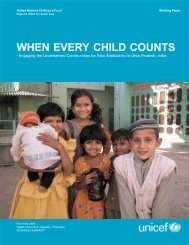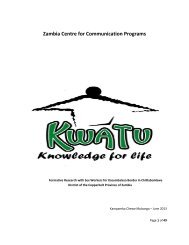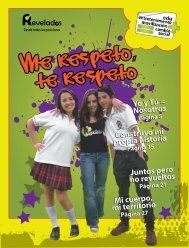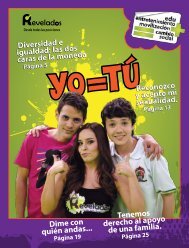to download the 38-page evaluation - The Communication Initiative ...
to download the 38-page evaluation - The Communication Initiative ...
to download the 38-page evaluation - The Communication Initiative ...
You also want an ePaper? Increase the reach of your titles
YUMPU automatically turns print PDFs into web optimized ePapers that Google loves.
Executive Summary<br />
One month of field research, including interviews, observation and focus groups with radio<br />
program listeners, partner radio station staff and training program beneficiaries, indicates that <strong>the</strong><br />
ongoing media and outreach activities of <strong>the</strong> United States Agency for International Development‘s<br />
(USAID) PDEV program continue <strong>to</strong> streng<strong>the</strong>n and expand <strong>the</strong> existing ―civic culture‖ in Niger and<br />
Chad. Fostering civic culture related directly <strong>to</strong> <strong>the</strong> PDEV project aims of including and broadcasting a<br />
culturally and geographically diverse set of moderate voices via radio programming and local production<br />
capacity building and increasing awareness and discussion on among citizens on issues of peace,<br />
<strong>to</strong>lerance and good governance. <strong>The</strong> inclusive and multi-layered design of PDEV media programming has<br />
resulted in a range of activities that include and address ordinary citizens and influential decision makers<br />
alike.<br />
This report documents <strong>the</strong> results of an end-line qualitative <strong>evaluation</strong> in Niger and Chad on <strong>the</strong><br />
media component of <strong>the</strong> Peace through Development (PDEV) program funded by USAID under <strong>the</strong><br />
Trans-Saharan Counterterrorism Partnership (TSCTP). Equal Access, a nongovernmental organization<br />
(NGO) specializing in development communication and outreach, implements <strong>the</strong> media component of<br />
<strong>the</strong> PDEV project and works in collaboration with <strong>the</strong> Academy for Educational Development (AED) 1 <strong>to</strong><br />
1) improve local governance in target communities; 2) empower at-risk youth <strong>to</strong> become active<br />
participants in <strong>the</strong>ir communities and <strong>the</strong> economy; and 3) render superfluous ideologies that promote<br />
violence.<br />
This report is a follow on <strong>to</strong> <strong>the</strong> mid-line <strong>evaluation</strong> that focused primarily on listener accounts<br />
of <strong>the</strong> impact of four radio programs produced by <strong>the</strong> PDEV media team (two in Niger and two in<br />
Chad), which are broadcast by a network of PDEV radio partners in each country. 2 That report<br />
documented numerous examples of individuals and communities inspired by PDEV radio programs <strong>to</strong><br />
engage in political and civic processes with local leaders and fellow community members.<br />
This report focuses on seven interventions that I describe, for reasons which will become clear<br />
in sections that follow, as ―sustained, multi-level activities.‖ With <strong>the</strong> exception of listening clubs (which<br />
were extended in <strong>the</strong> 12 months since my first report), <strong>the</strong>se activities are all second stage activities,<br />
building on successes and lessons learned from first stage activities that have been previously reported<br />
on. <strong>The</strong>se activities include:<br />
1. <strong>Communication</strong> training for religious leaders and association members (Niger)<br />
2. Media guide for conflict situations (ONIMED) (Niger)<br />
3. ―Year-3‖ radio programs (Niger and Chad) 3<br />
4. Local production: Building <strong>the</strong> capacity of radio partners (Niger and Chad)<br />
5. Radio station peer men<strong>to</strong>ring (Chad)<br />
6. Listening clubs (Niger and Chad)<br />
7. Listener engagement mechanisms: Frontline SMS/Text message software (Chad and Niger) and<br />
FreedomFone interactive voice response (IVR) (Niger).<br />
1<br />
AED has been acquired by FHI 360 and now bears that name.<br />
2<br />
Greiner, K. (2010). Applying local solutions <strong>to</strong> local problems: Radio listeners as agents of change. Washing<strong>to</strong>n, DC:<br />
USAID.<br />
3<br />
I use <strong>the</strong> term ―Year 3‖ radio programs for <strong>the</strong> religious-<strong>the</strong>med programs Sada Zumuntchi (Niger) and Chabab<br />
Waddin (Chad). I emphasize <strong>the</strong> ―Year 3‖ designation because I believe that <strong>the</strong>se programs are able <strong>to</strong> include<br />
senstive, conflict-related content precisely because <strong>the</strong>y come after steadily building credibility (and familiarity)<br />
over two years of more general programming related <strong>to</strong> peace, <strong>to</strong>lerance and democratic expression.<br />
1



